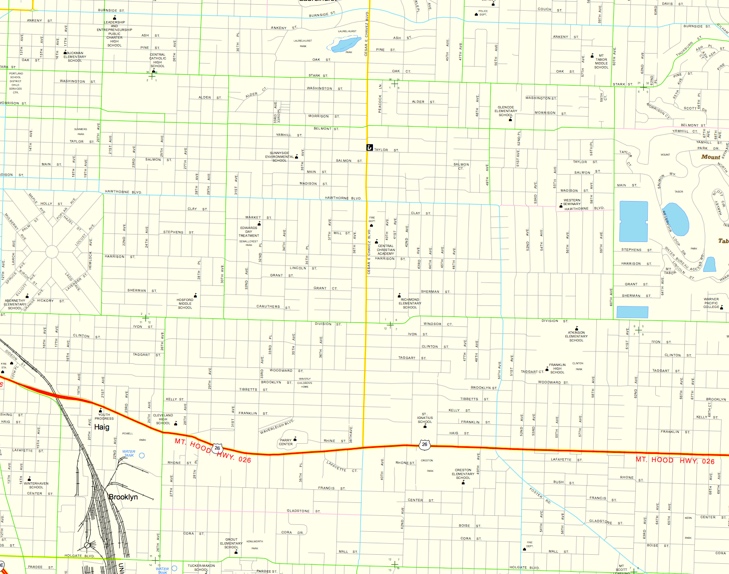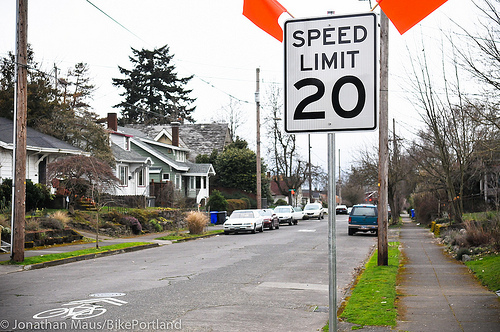A bill that would give cities across Oregon new powers to lower speed limits without first seeking permission from the State of Oregon has been significantly amended ahead of a hearing and possible vote tomorrow (Wednesday, 4/12).
House Bill 2682 seeks to change Oregon’s rules for setting maximum speeds (ORS 810.180). While the Oregon Department of Transportation (ODOT) doesn’t manage or own most local streets, the agency still controls speed limits. As more cities adopt Vision Zero plans and struggle to respond to an increase in injuries and deaths to vulnerable road users, the City of Portland and local House Representative Rob Nosse led the charge to create this bill. When it was first introduced, the bill was devilishly simple and would have given broad new authority to all cities across Oregon to set their own speed limits without going through ODOT.
Now, as the legislative session heads into crunch time, a major amendment would reduce most of that authority, but also make the bill much more likely to pass.
“Sometimes you start with a concept that’s a little too aggressive. We’ve narrowed the focus of the bill to make it more workable.”
— Rob Nosse, Oregon House Rep (D-Portland)
The amended bill has been almost entirely re-written. The new language restores ODOT’s authority to sign-off on speed limit change requests with a few key exceptions. Here’s the new language in the amended version:
The City of Portland may establish by ordinance a designated speed for a highway under the jurisdiction of the city that is five miles per hour lower than the statutory speed. The following apply to the authority granted under this subsection:
(a) The highway is located in a residence district.
(b) The highway is not an arterial highway.
(c) The city shall post a sign giving notice of the designated speed at each end of the portion of highway where the designated speed is imposed and at such other places on the highway as may be necessary to inform the public. The designated speed shall be effective when signs giving notice of the designated speed are posted.
Advertisement

The proposed amendment means the bill would only apply to the City of Portland and could only be used to lower the speed limit by five miles per hour on minor streets that run through residential areas. In some ways this bill would simply be an expansion of the law passed in 2011 which gave the City of Portland the authority to set speeds on neighborhood greenways to 20 mph. That law can only be applied to specific streets where PBOT has installed speed bumps and other features to prioritize biking and walking. If HB 2682 passes, PBOT would be able to lower speed limits on all residential streets regardless of if they are in the neighborhood greenway network or not.
“If this bill passes, we would be able to set the speed to 20 mph on all of our residential streets. In other words, we could implement “20 is plenty” across the city on neighborhood streets.”
— City of Portland
Reached via phone in his office this morning, Rep. Nosse said he’s happy with the compromises in the bill. “Sometimes you start with a concept that’s a little too aggressive,” he said. “We’ve narrowed the focus of the bill to make it more workable.” In other words, the bill was dead and Nosse is doing what he feels is needed to keep it alive.
Nosse added that while Portland is eager for more speed setting authority, other cities and counties didn’t want the legal liability that comes with that authority.
Policy Director for The Street Trust Gerik Kransky echoed Nosse’s sentiments on the proposed amendments. “The bill as written was inoperable from cities, counties, and the states’ perspectives, each with a different take on why it wouldn’t work for administrative and/or functional reasons,” he shared with us via email this morning. Kransky said the difference in safety between someone driving 25 and 20 miles per hour on a residential street is “significant.” “I think this bill will save lives if we can get it to pass.”
PBOT says despite the new language, they’d be “very happy” if the bill passes. “Currently the statutory speed for residential streets is 25 mph. If this bill passes, we would be able to set the speed to 20 mph on all of our residential streets. In other words, we could implement “20 is plenty” across the city on neighborhood streets. The bill would also make it easier to drop speeds around schools.”
In written testimony submittted to the committee yesterday, southeast Portland resident Marsha Hanchrow expressed her disappointment with the changes in the bill. “No spine remaining at all,” she wrote. “Portlanders have been killing each other with vehicles in increasing numbers lately, and the easiest, cheapest, and most sure way to slow or stop the carnage is to slow vehicle speeds. Please allow the city to determine the allowable speeds for city roads of all categories.”
While the bill wouldn’t apply to Portland’s meanest streets like Division and Powell, PBOT has other tools available to lower speed limits on those streets. They recently reduced speeds on SE Hawthorne Blvd and SE Division.
The public hearing and possible vote on HB 2682 is scheduled for tomorrow (4/12) at 8:00 am in the House Committee on Transportation Policy. If you’d like to submit written testimony you have until 12:00 noon today to email it to htp.exhibits@oregonlegislature.gov (put House Bill 2682 in the title).
(Note: The Safe Routes to School bill, HB 3230 will also get a public hearing at that same meeting.)
— Jonathan Maus: (503) 706-8804, @jonathan_maus on Twitter and jonathan@bikeportland.org
BikePortland is supported by the community (that means you!). Please become a subscriber or make a donation today.



